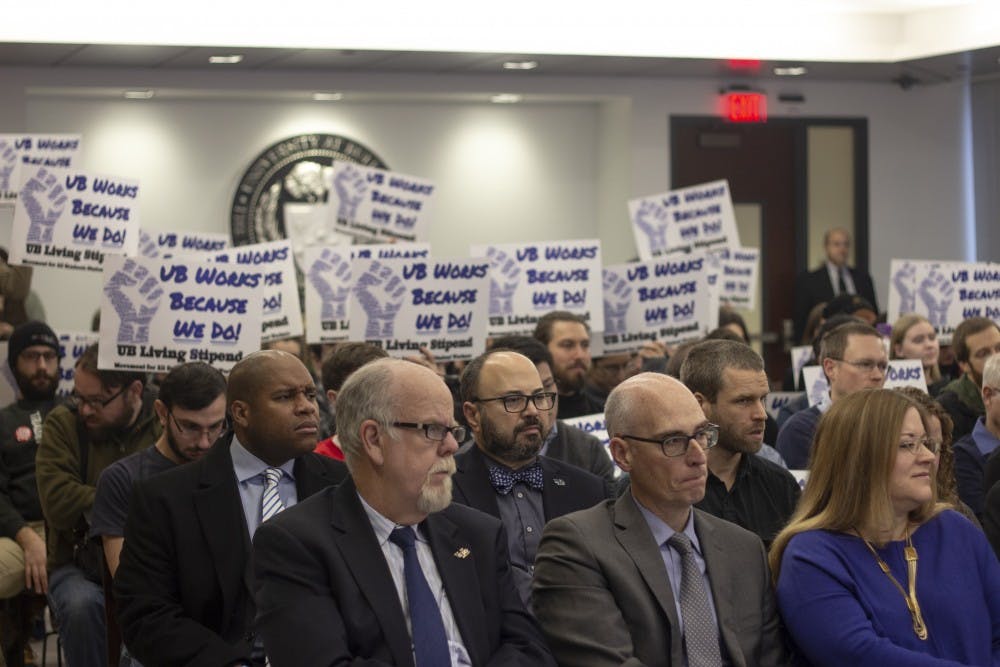Graduate students held signs reading “UB works because we do” and chanted with clenched fists as the UB Council conducted its Monday meeting in Capen Hall’s Buffalo Room.
Roughly 100 TAs, faculty, graduate students and Ph.D. students attended the meeting to voice concerns about the university’s choice to not increase graduate student stipends.
UB Council members dedicated the majority of the 35-minute meeting to explain the stipend issue through data presentations on university-wide and department-wide stipend packages.
The council allowed Living Stipend Movement members along with other UB administrators into the Buffalo Room and there was extra seating available for additional members of the community.
Monday’s meeting was a drastic change from the council’s October meeting, when the UB Council violated New York State’s Open Meetings Law and denied community members into its meeting room.
After Chairman Jeremy Jacobs’ and student representative Mike Brown’s opening addresses, Craig Abbey, associate vice president and director of Institutional Analysis, outlined the university’s investment in graduate education and how its stipends compare to other Association of American Universities schools.
Robin Schulze, Dean of the College of Arts and Sciences and Liesl Folks, Dean of the School of Engineering and Applied Sciences, also presented on their schools’ respective Ph.D. stipend packages.
Both deans reiterated that departments can use their money as they please and that shrinking cohorts to increase stipends is a respectable solution. Schulze said because of United University Professions’ mandated faculty payroll increases, the College of Arts and Sciences is facing a $12 million deficit and cannot spare any more money to raise stipends.
“I would love to be able to raise those stipend budgets for each department but honestly, right now we are simply trying to make it through the cycle of pay increases and stabilize the finances of the college,” Schulze said.
After learning more about the issue, council members said they felt it wasn’t their place to discuss financial issues within specific departments. Councilor June Williams Hoeflich said she appreciated the presentations and “learned a lot” about students’ financial issues, but remained against getting involved in the issue.
“I know many of you students are here for the issue of stipends, but the goal of the council really isn’t to manage the financial operations of the university,” Williams Hoeflich said. “It’s left up to the department heads and the deans and I think our role is really an advisory role for the president, not about the university’s finances.”
Jacobs quickly adjourned without a public period for comment after Williams Hoeflich’s comments.
After the meeting ended, graduate students said they listened peacefully and requested that council members do the same for them.
James Jarvis, associate counsel to President Satish Tripathi, squashed the issue by reminding audience members that Open Meetings Law allows members of the public to attend and listen to a meeting, but doesn't require public bodies to hold periods of public comment.
Brown said the UB Council should consider following the SUNY Board of Trustees by adding a seperate public forum where community members can meet with council members and discuss topics like increasing stipends.
“I don’t think it’s too much to ask for, a public period of comment,” Brown said. “This is a very complicated issue, none of [the councilors] deny that, so I don’t see why we can’t have a discussion about it. … I’m disappointed that my fellow council members don’t see addressing [increasing stipends] as a part of their job to review and recommend positive changes for the university.”
Jacobs told Brown to submit a written request and said he would consider it for the council’s next meeting in March. Brown agreed and said he plans to meet with members of the Living Stipend Movement to find a time to meet with council members and schedule a forum for the spring semester.
Many of the council’s presentations were the same ones shown during the Nov. 27 Faculty Senate meeting and many of their points were word-for-word.
Some graduate students in attendance were present at that Faculty Senate meeting and said they felt by using the same presentations to fill time during the council meeting, council members were wasting time that could be used for discussion.
English Ph.D. student Ariana Nash said the figures in the powerpoint did not include mandatory fees, which are subtracted from the stipends provided. She said UB has some of the highest mandatory fees compared to other AAU institutions.
“In all of those bar graphs we drop right down when you include those fees, so it doesn't even begin to cover the problem,” Nash said. “They continually foist responsibility onto departments and yet they set department budgets. So if you ask any of them who is responsible, they will say the department. But that is nonsense of course departments would love to pay us more. They can't, they don't have the money to.”
English professor Jim Holstun said UB has defined a living stipend as “allowing Ph.D. students to be full time students, so they wouldn’t have to have a second job to sustain themselves and they would not have to assume any more student debt during their graduate studies,” and said he believes the university must uphold this definition.
“The purpose of financial support is to enable GAs and TAs to work full time on their degrees. [The university] states this in so many words,” Holstun said. “The university is in radical contradiction with itself. It must address this problem. It is a responsibility of the UB Council to review and approve the yearly budget at the University at Buffalo. It's time for the UB Council to do its job.”
Jacky Chow, a biology Ph.D. candidate, said he appreciated the council holding its meeting in a larger room, but was annoyed that it denied the members of the Living Stipend Movement the right to ask questions. He said he feels the university is stymying efforts to discuss stipends in an effort to wait for the current batch of graduate students to graduate.
“It’s like we took two steps forward but one back. They let us all into the meeting but kept us silent,” Chow said. “I think they’re waiting for us all to graduate with the hope that this movement will disappear with us. Regardless of if conditions improve for us, UB will still have a group of disgruntled new Ph.D. students who won’t be earning enough to support themselves.”
Max Kalnitz and Jacklyn Walters are news editors and can be reached at max.kalnitz@ubspectrum.com and jacklyn.walters@ubspectrum.com

Jacklyn Walters is a senior communication major and The Spectrum's managing editor. She enjoys bringing up politics at the dinner table and seeing dogs on campus.





